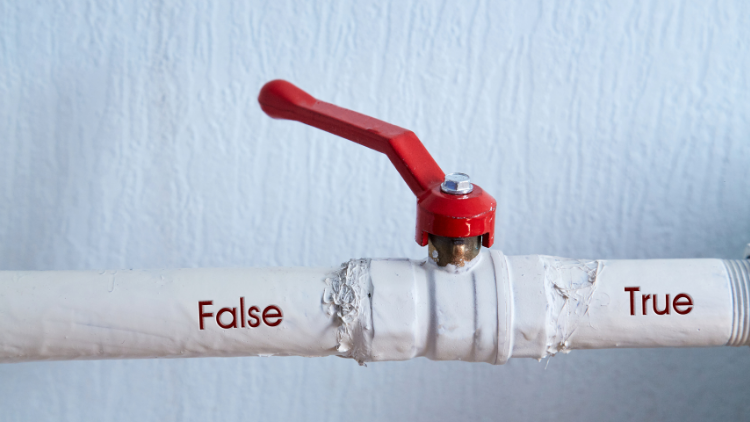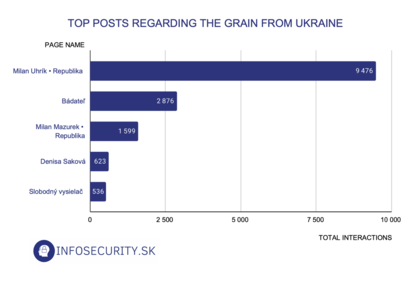DISINFORMATION
Imported grain from Ukraine dubbed “toxic” by dubious actors spreading anti-Ukrainian sentiment

Infosecurity.sk presents an overview of disinformation trends that have been on the rise in information space in the past two weeks:
- Disinformation actors are spreading false information about the economic and cultural decline of the West while praising Russia and China.
- Furthermore, they are trying to paint the Western leaders as incompetent, for which the recent news of the US military documents leak is being widely utilised.
- The supposed “faulty” grain from Ukraine, which has been proven safe for consumers, became a focal point of anti-Ukrainian sentiment. Various dubious actors are especially criticising Slovakia for providing aid to Ukraine.
Anti-Western narratives of decadence
Slovak social media platforms are constantly flooded with an abundance of anti-western content, primarily from opposition politicians and unreliable political commentators. These posts are then shared by popular disinformation sites, consequently amplifying this sentiment. In the past two weeks, Western criticism of military aid to Ukraine has subsided and we are beginning to observe a more general narrative - that the West, led by the US and the EU, is in a state of decline. At the same time, disinformation actors are portraying China and Russia as the polar opposite.
The most active actor in sharing narratives about the decadence of the West, while simultaneously praising Russia and China, is Milan Uhrík, an MEP and a chairman of the far-right Republika party. On his Facebook page, he posted a video of his speech in the European Parliament where he openly accuses the EU of serving American business interests and blindly going into conflict with China. In the caption, he writes: “The world is changing, the influence of the West is waning. Anyone who is not willfully blind can see this.” Uhrík continues his long-standing tendency of looking uncritically at China and Russia, which he defends with unsubstantiated statements about the economic and cultural decline of Western countries.
Similar rhetoric is being utilised by other opposition politicians such as Milan Mazurek, who is also a member of the Republika party. In a Facebook post, which has accumulated over 17 thousand interactions at the time of writing this report, Mazurek reacts to a 2022 Country Report on Human Rights Practices published by the U.S. Department of State, which mentions him as one of the sources of disinformation and extremist sentiments in Slovakia. Mazurek calls the report “tendentious nonsense”, points to certain social issues in the US such as homelessness or drug abuse in some areas of the country and even proceeds to blatantly make jokes about American President Joe Biden. This kind of whataboutism and nit-picking can be seen as a way of deflecting all criticism against him and simultaneously portraying the US as a decadent nation, which is an assertion based on a very limited number of examples.
The Western leadership is incompetent, according to disinformers
This false narrative of the decadence of the West can also be seen in the questioning of the Western leaders’ leadership abilities. The most recent event that has sparked a wave of this type of disinformation is the leak of secret US military documents, which some disinformation actors see as the proof of the incompetency of the country’s representatives.
This subnarrative is being spread mainly by one person - Ľuboš Blaha, a member of an anti-system SMER-SSD party who is currently banned on Facebook. On his Telegram channel, he presents the recent leak as a demonstration of Washington's supposed incompetence. He then proceeds to call the US “unserious”, compares it to a third-world country and, similarly to Mazurek, insults President Biden. The post has been re-shared by the disinformation site Hlavný denník (“The Main Journal”).
Blaha is notoriously known for his uncritical rhetoric towards Russia as well as for actively spreading pro-Kremlin propaganda. He often seizes any opportunity to discredit the West, regardless of whether his claims are factually supported or not, which was the case concerning the recent leak in his post.
It is also important to note that the aforementioned subnarrative is not being spread only regarding the US, but also concerning the EU. Robert Fico, chairman of SMER-SSD and former prime minister, wrote in a Facebook post: “The European Union is vital for Slovakia. However, it currently has disastrous leadership. We cannot expect any degree of self-reflection from the current EU leadership…” By this baseless statement, he expresses a tendency to pragmatically criticise and stand up against Western countries and organisations. He has amplified this rhetoric considerably in recent months as part of an effort to score as many political points as possible ahead of the elections.
Ukraine's “faulty” grain gives way to anti-Ukrainian sentiment
Mill in the city of Kolárovo found that a shipment of grain from Ukraine contained the substance chlorpyrifos, a pesticide, in excess of the permitted levels. Since two separate tests showed different results, the Kolárovo mill had the flour produced from this wheat tested as well. The results confirmed that pesticides are not present in the flour at all, which means that the final product does not pose any risk to health at all.
The substance whose residue was identified is used in more than 100 countries around the world and until 2020, it was also allowed in the EU. Experts also say that similar findings are not only specific to grain from Ukraine but also to some Slovak products themselves. Still, multiple disinformation actors seized the opportunity to exaggerate the situation and spread anti-Ukrainian sentiment.
Pro-Russian disinformation page Armáda Ruskej Federácie (“Army of The Russian Federation”) writes: “We have been sending millions to Ukraine in arms, humanitarian aid, various grants, fundraisers have been organised and this is what we have received: The rising cost of oil transit, the noxious grain that was originally supposed to save Africa, and the collapse of domestic agriculture.” This statement is highly misleading since it tries to paint a picture of Slovakia’s aid to Ukraine as unrequited and in vain. It also diverts attention from the aggressive actions of Russia.
Another disinformation site Bádateľ commented on the situation as follows: “When baby milk was contaminated in China, those responsible received the death penalty. What punishment will those responsible for toxic grain in our country receive?” The 2008 Chinese scandal with contaminated milk was a significant public safety incident that lead to multiple deaths. It cannot be in any way compared to the situation with Ukrainian grain, which has been proven to pose no health risk to consumers. By comparing the incomparable, Bádateľ purposefully misleads the public and amplifies the already hostile sentiment towards Ukraine, in addition to sowing baseless fear of Ukrainian products in the public as well as painting a negative picture of the country in general. Mentions of the death penalty are also considerable hyperbole, as Slovakia is a democratic state that cannot be compared to the Chinese regime in any form.
Far-right politicians commenting on the “faulty” grain situation
Since the incident with the Ukrainian grain has been one of the major topics in Slovak information space in the past two weeks, we also looked at it through an optic of a list of disinformation actors in Slovakia. We used the CrowdTangle analysis tool to analyse the most popular posts on Slovak Facebook that include the keywords “Ukraine“ and “grain”. Posts were evaluated based on the total number of interactions (the sum of all reactions, comments, and shares).

Milan Uhrík posted a video, in which he calls the imported Ukrainian grain “toxic” and says: “Slovakia is doing enough for Ukraine. Ukrainian businessmen sell us grain filled with chemicals and pesticides as a 'reward'. This is what our children should be eating?” He once again exaggerates the entire situation and with similar rhetoric mentioning children he tries to evoke negative feelings in citizens towards Ukrainians. The video has accumulated over 78 thousand views at the time of writing this report.
The next place belongs to the aforementioned post by Bádateľ, where the site creates a false correlation between the Chinese contaminated milk incident and the Ukrainian grain, which is not harmful to health.
The third post belongs to Milan Mazurek, who re-shared the video of Milan Uhrík, thus helping it gain more traction.
The fourth place belongs to Denisa Saková, an MP for the Hlas-SD party. In a Facebook post, she calls the grain imported from Ukraine “defective and health-threatening”, which is in direct contradiction with the test results and opinions of experts.
Disinformation site Slobodný vysielač (“Free broadcaster”) writes the following: “It is, of course, no surprise that the biggest lackey state in the V4 when it comes to following orders from its masters - the great white father from Washington and the lords and ladies in command from Brussels - Slovakia continues to have no problem thinking first and foremost about the interests of Ukraine rather than the safety of its own population.” By this kind of rhetoric, they are amplifying an already present narrative of Slovakia lacking autonomy and serving foreign interests, which is completely unsubstantiated. Furthermore, statements that Slovakia cares more about Ukrainians than its own citizens are highly misleading and are nothing more than a tool to undermine support for the victim of Russian aggression.
Project Infosecurity.sk organized by Adapt Institute, which is supported by the Prague office of the Friedrich Naumann Foundation for Freedom, continuously monitors the activities of both Slovak and foreign disinformation actors, but focuses mainly on the former. The project activities are built upon daily monitoring of emerging disinformation, hoaxes, and conspiracy theories in the online information space. This approach allows the analysts to identify disinformation posts and narratives that resonated with the public the most, as well as to find out where they originated, and how they spread and evolved on social media. The report takes the form of a bi-weekly summary of arising trends in the spread of malicious information content online. Based on that, Infosecurity.sk can warn the public about emerging and current trends in the field of disinformation, manipulation, and propaganda.

